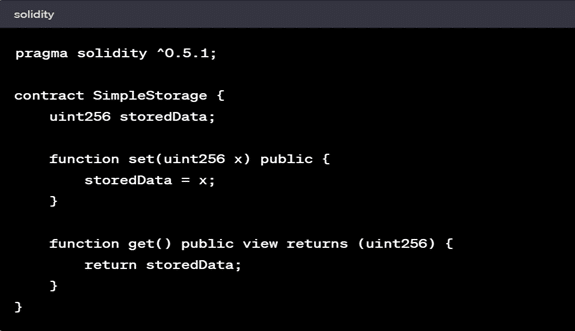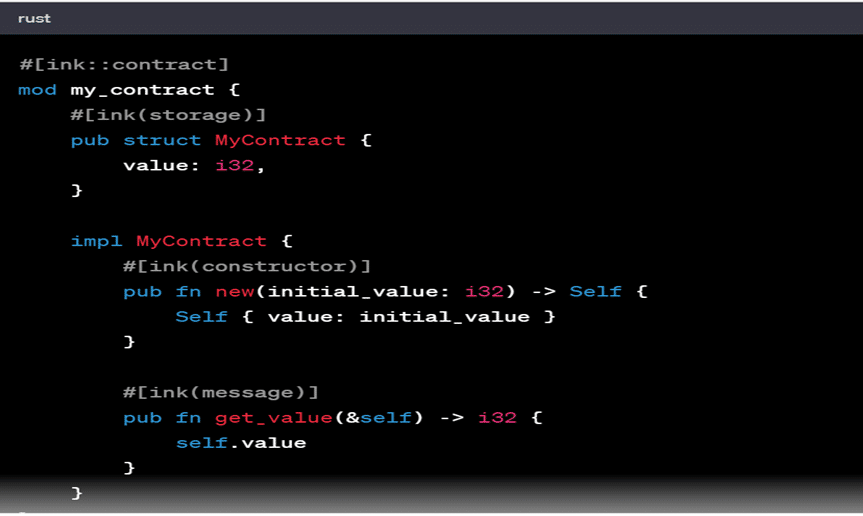In the evolving landscape of decentralized applications (DApps), a multitude of programming languages are vying for developers’ attention. Platforms like Cardano have entered the scene, making the choice of a programming language for DApps more nuanced than ever. In this guide, we explore popular programming languages used for Developing DApp, including Ethereum’s Solidity, JavaScript, Python, Rust, Go, Haskell, and Cardano-specific languages like Plutus and Marlowe.
Solidity: The Ethereum Champion
Solidity is a statically-typed programming language designed specifically for smart contract development on the Ethereum blockchain.
Advantages
• Designed for Ethereum Smart Contracts
• Highly secure and robust
• Rich community and documentation
Example

JavaScript: The All-Rounder
JavaScript is a high-level, interpreted language known for its role in web development. It is commonly used for front-end blockchain interactions via libraries like Web3.js.
Advantages
– Web3.js enables interaction with blockchain
– Asynchronous operations are native
– Ubiquitous in web development
Example

Python: The Versatile Option
Python is a high-level, interpreted language widely used for web development, data analysis, artificial intelligence, and more. It is also used in DApp development through the Web3.py library.
Advantages
– Easy to understand and write
– Web3.py for Python developers to interact with Ethereum
– Good for data analysis and off-chain operations
Example

Rust: Performance Meets Security
Rust is a systems programming language known for its memory safety features. It’s becoming increasingly popular for blockchain development.
Advantages
– Ideal for creating high-performance DApps
– Strong memory safety features
– Growing ecosystem
Example

Go: Efficiency and Concurrency
Go is a statically typed compiled language designed for efficiency and scalability. It’s often used in creating enterprise-level blockchain platforms like Hyperledger Fabric.
Advantages
– High efficiency and scalability
– Native support for concurrent programming
– Used in creating Hyperledger Fabric
Example

Haskell: The Academic Favorite
Haskell is a high-level, purely functional programming language. It’s often used in academia and has a strong emphasis on type safety and formal verification, making it well-suited for blockchain and smart contract development.
Advantages
– Strong type system ensures code correctness
– Used in formal methods and verification
– Functional programming paradigm
Example

Cardano Languages: Plutus and Marlowe
Plutus
Plutus is a smart contract development language for Cardano, taking inspiration from Haskell.
Advantages
– Tailored for Cardano’s blockchain
– Combines Haskell principles for robust and secure contracts
– Powerful for financial contracts
Example

Marlowe
Marlowe is a domain-specific language (DSL) for creating financial smart contracts on the Cardano blockchain
Advantages
– DSL (Domain Specific Language) for financial contracts on Cardano
– No blockchain coding experience needed
– Allows you to define smart contracts as financial instruments
Example

Conclusion
The array of programming languages for Developing DApp has expanded to include diverse and powerful options, from Ethereum’s Solidity to Cardano’s Plutus and Marlowe. Each language has its unique strengths, whether it’s the ease of use in Python, the performance of Rust, the concurrency in Go, or the mathematical rigor of Haskell. The ideal choice of language will depend on your specific requirements, the blockchain platform you’re targeting, and your expertise in the language. Choose wisely and happy coding!
